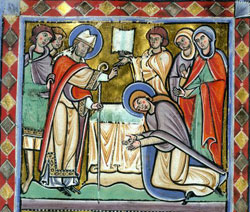
Feastday: February 21
Birth: 580
Death: 640
Frankish mayor of the palace, duke of Brabant, and the chief political figure during the reigns of the Frankish kings Clotaire II, Dagobert I, and Sigebert TI . The husband of Blessed Ita, he was a close ally of Bishop Arnulf of Metz with whom he overthrew Queen Brunhilda of Austrasia. He was soon appointed mayor of the palace for his role. Following an incident in which he reprimanded King Dagobert I for his adulterous life, he was exiled from the court and went into retirement near Aquitaine. Re called to serve as tutor to Dagobert's three year old son, Pepin once more became the chief figure of the king dom until his death. Pepin earned a reputation for defending the interests of the Church, promoting the spread of Christianity, and working to have only truly worthy bishops appointed to Frankish sees. While never canonized, he is listed as a saint in some old martyrologies. He was an ancestor of Charlemagne; his grandson, Pepin of Heristal, founded the Carolingian dynasty.
Mayor of the Palace of Austrasia under King Dagobert III (623-629) "Pepin I" redirects here. For the king of Aquitaine, see Pepin I of Aquitaine. For the count of Vermandois, see Pepin, Count of Vermandois.
 Pepin of Landen and his contemporary Remaclus at the façade of the provincial palace in Liège
Pepin of Landen and his contemporary Remaclus at the façade of the provincial palace in Liège
Pepin I (also Peppin, Pipin, or Pippin) of Landen (c. 580 – 27 February 640), also called the Elder or the Old, was the Mayor of the palace of Austrasia under the Merovingian King Dagobert I from 623 to 629. He was also the Mayor for Sigebert III from 639 until his death.
Through the marriage of his daughter Begga to Ansegisel, a son of Arnulf of Metz, the clans of the Pippinids and the Arnulfings were united, giving rise to a family which would eventually rule the Franks as the Carolingians.
Life
Pepin's father is named Carloman by the Chronicle of Fredegar, the chief source for his life. His byname comes from his probable birthplace: Landen, modern Belgium. However, according to Godefroid Kurth, it was only in the twelfth century that the chroniclers of Brabant began to associate him with that locality. He is sometimes called Pepin I and his other nicknames (Elder and Old) come from his position at the head of the family called the Pippinids after him.
He was lord of a great part of Brabant, and governor of Austrasia, when Theodebert II, king of that country was defeated by Theodoric II, king of Burgundy. In 613, several leading magnates of Austrasia and Burgundy abandoned Brunhilda, the great-grandmother and regent of their king, Sigebert II, and turned to Chlothar II of Neustria for support, promising not to rise in defense of the queen-regent and recognizing Chlothar as rightful regent and guardian of the young king. Chief among these leading men were Warnachar II, Rado, Arnulf, and Pepin. The latter two were described by Fredegar as the "two most powerful barons of Austrasia" and they made some agreement with Chlothar at Andernach. However, while Rado was confirmed as mayor in Austrasia and Warnachar in Burgundy, Pepin did not receive his reward until 623, when he was appointed mayor in Austrasia after Chlothar made his young son Dagobert king there. Arnulf, his lifelong friend, was appointed adviser to the new king alongside him.
Pepin was praised by his contemporaries for his good government and wise counsel. Though some enemies tried to turn the king against him, their plots were foiled and Pepin remained on good terms with the king until 629, when, for reasons unknown, he retired (or was retired) to his estates, where he remained for the next decade, until Dagobert's death.
On Dagobert's death, Pepin came out of retirement to take on the mayoralty in Austrasia for the heir Sigebert III and to oversee the distribution of the treasury between Sigebert and his brother, Clovis II, and his stepmother Nanthild, who was ruling on Clovis' behalf in Neustria and Burgundy. Sigebert's share of the inheritance was amicably surrendered, partly because of the friendship between Pepin and the Burgundian mayor of the palace, Aega. Pepin and Arnulf's successor as chief counselor to the king, Cunibert, Bishop of Cologne, received the treasure at Compiègne and brought it back to Metz. Pepin died in 640. He was so popular in Austrasia that, though he was never canonized, he was listed as a saint in some martyrologies. Butler lists him as "blessed". His feast day was 21 February.
He left two daughters and two sons by his wife, Itta:
- Begga, married the aforementioned Ansegisel and later canonized
- Grimoald, later mayor of the palace like his father
- Bavo (or Allowin), became a hermit and later canonized
- Gertrude, entered the convent of Nivelles founded by her mother, also later canonized.
Notes
- ^ Butler, Alban. Lives of the Saints, Vol. II, 1866
- ^ Kurth, Godefroid. "The Franks." The Catholic Encyclopedia Vol. 6. New York: Robert Appleton Company, 1909. 21 March 2016
- ^ Monks of Ramsgate. “Pepin of Landen”. Book of Saints, 1921. CatholicSaints.Info. 14 September 2016
Sources
- Oman, Charles. The Dark Ages 476–918. London: Rivingtons, 1914.
- Wallace-Hadrill, J. M., translator. The Fourth Book of the Chronicle of Fredegar with its Continuations. Connecticut: Greenwood Press, 1960.





